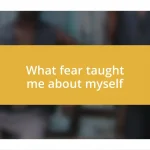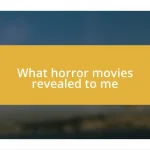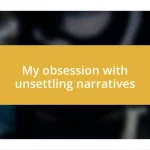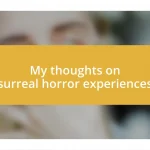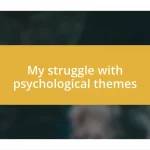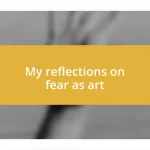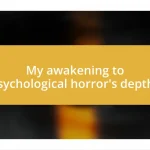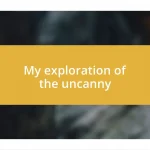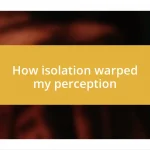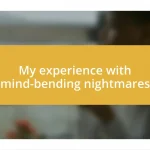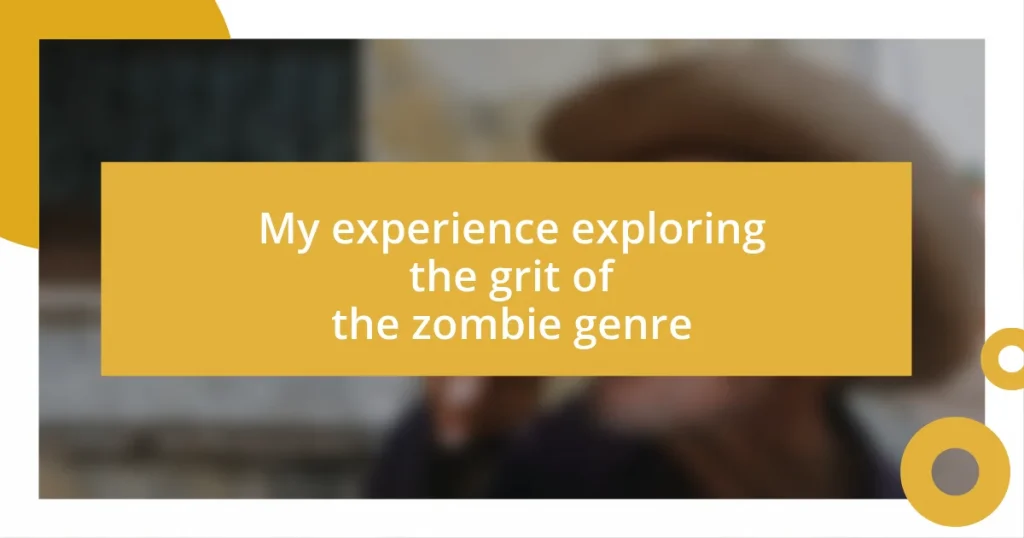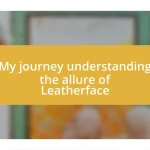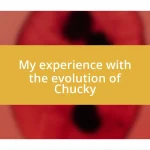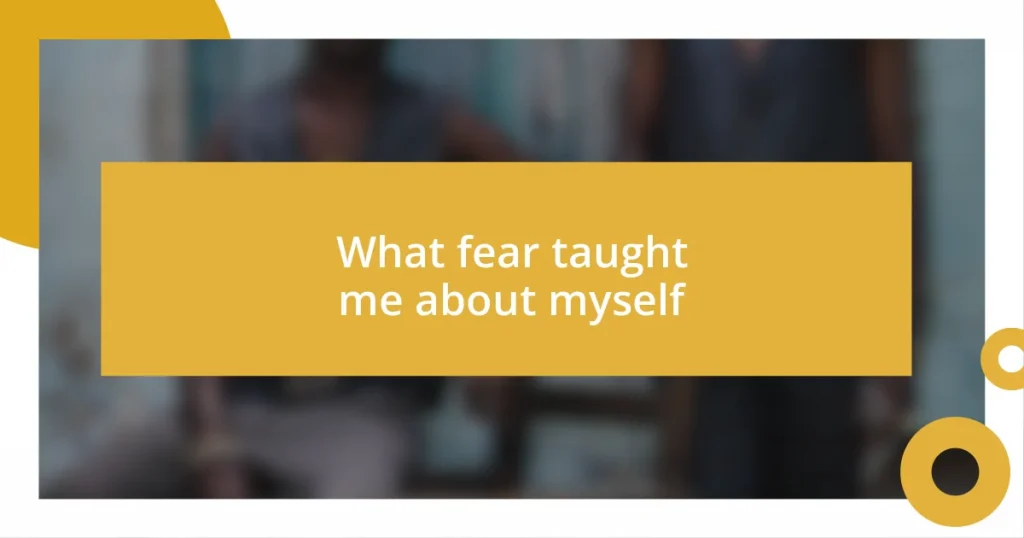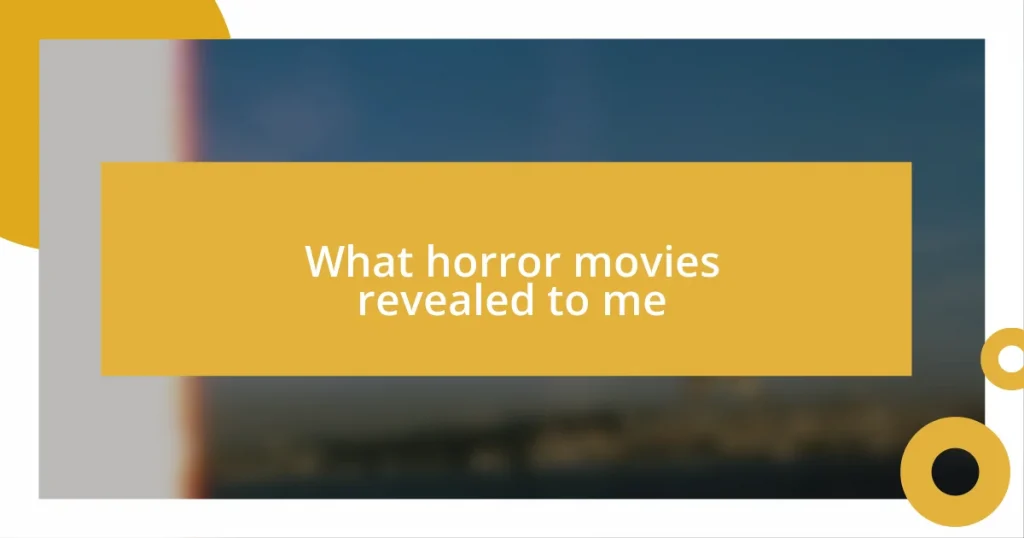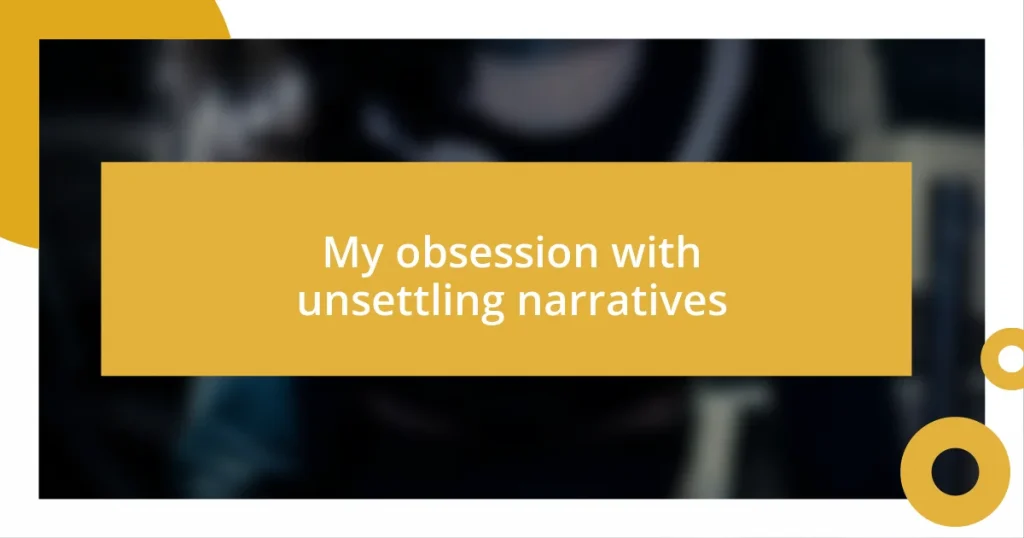Key takeaways:
- The zombie genre serves as a lens to explore human nature, societal issues, and moral dilemmas, reflecting our deepest fears and desires.
- Historical roots of zombies stem from folklore, particularly Haitian Vodou, evolving into symbols of social commentary in modern narratives like “Night of the Living Dead.”
- The future of the zombie genre is likely to integrate interactive storytelling, genre blending, and deeper social critiques, addressing contemporary issues such as climate change and pandemics.

Understanding the zombie genre
The zombie genre often embodies a fascinating mix of fear, survival, and societal reflection. I remember the first time I watched a classic like “Night of the Living Dead.” The sheer tension of humans battling not just their undead foes but also their own moral dilemmas left a lasting impression on me. Can you feel that pulse of dread when survival instincts kick in?
At its core, this genre isn’t just about the zombies; it’s about what they represent. The zombie apocalypse acts as a backdrop to explore humanity’s darkest sides—greed, betrayal, and the breakdown of social structures. I often find myself pondering: what would I do in a world overrun by the undead? Those moments of reflection make the genre resonate deeply with our own fears and desires.
What I love most about the zombie narrative is its unpredictability. While many horror genres might follow predictable tropes, the zombie genre thrives on chaos and unpredictability. One minute you think you have a handle on things, and then, bang! Unexpected twists shift everything. That sense of suspense keeps the viewer—and myself—on edge, always second-guessing what’s coming next.

Historical roots of zombie fiction
Zombie fiction has its historical roots in various cultures and mythologies, particularly in Caribbean folklore. The idea of the “zombi” originates from Haitian Vodou, where the dead are believed to be resurrected and controlled by sorcerers. I often think about the chilling tales I’ve heard about this belief system; the notion that a person could be turned into a mindless servant is both fascinating and terrifying. It paints a compelling image of life and death that lingers in our psyche.
As time progressed, these folklore elements began to morph, finding their way into literature and cinema. The early 20th century saw the zombie transform into a symbol of social commentary. I was captivated by how films like “White Zombie” and George A. Romero’s “Night of the Living Dead” tackled social issues through the lens of these monsters. When I first realized how deeply these narratives reflected societal fears—like consumerism and civil rights—I couldn’t help but feel an emotional connection to the stories. It’s incredible how zombies have served as a canvas for exploring humanity’s underlying anxieties.
The evolution of the zombie genre has continued to branch out while remaining rooted in its folkloric origins. By examining different interpretations across various media—from literature to film—I’ve discovered how themes of survival and the human condition resonate universally. When I dive into a zombie narrative, I often reflect on how each reimagining transports me back to these historical roots while also challenging me to confront my own values and beliefs.
| Source | Era |
|---|---|
| Haitian Vodou | 19th Century |
| White Zombie (film) | 1932 |
| Night of the Living Dead (film) | 1968 |
| The Walking Dead (comic series) | 2003 |

Key themes in zombie narratives
The key themes in zombie narratives often delve into deep societal issues and moral questions that resonate with our own realities. I remember a tense discussion I had with friends after watching “The Walking Dead”—we debated what choices we would make to survive in a post-apocalyptic world. It made me realize that these narratives challenge us to confront our values when survival is at stake.
Here are some prominent themes:
- Survival: Characters are pushed to their limits, forcing them to make impossible choices.
- Humanity vs. Monstrosity: The distinction between humans and zombies blurs, raising questions about what it means to be truly alive.
- Societal Breakdown: The collapse of social order exposes deep-rooted issues like racism, classism, and authority struggles.
- Isolation and Community: Narratives explore the balance between the need for human connection and the instinct to protect oneself.
- Fear of the Unknown: The terror of confronting the undead serves as a metaphor for facing our fears and the unpredictability of life.
Reflecting on these themes during a film night with friends, I felt a wave of nostalgia combined with tension. It’s striking how each movie evokes such strong emotions, compelling discussions about our fears and desires. Each zombie story serves as a mirror, reflecting our darkest instincts and our capacity for compassion in the harshest of conditions.

Impact of culture on zombies
The cultural impact on zombies is profound, shaping how we interpret these figures across different societies. For me, watching films from various countries reveals unique anxieties rooted in cultural contexts. I recall my first experience with a South Korean zombie film, “Train to Busan.” It was not just a thrilling ride; it opened my eyes to the cultural critiques regarding family and societal expectations prevalent in Korean society.
As I explored zombies in global cinema, I noticed how they often reflect local fears and issues. In the UK, for example, the zombies in “28 Days Later” embody a fear of viral outbreaks, while in many Latin American tales, they often address historical trauma and colonialism. Each interpretation offers a fresh perspective, making me wonder: how much do our cultural contexts influence our understanding of horror? The answer, I believe, is significant; it shapes not just the narratives, but also viewers’ emotional responses to them.
When I dive into a zombie movie from a different culture, I can’t help but feel a sense of connection to those fears and fight-or-flight instincts. For instance, the haunting atmosphere in the Spanish film “REC” had me gripping my seat. It pushed me to reflect on issues of trust and security in a world that feels increasingly unstable. It’s fascinating how culture weaves through each layer of zombie lore, creating a rich tapestry that goes beyond mere entertainment, provoking deeper thought and emotional resonance.
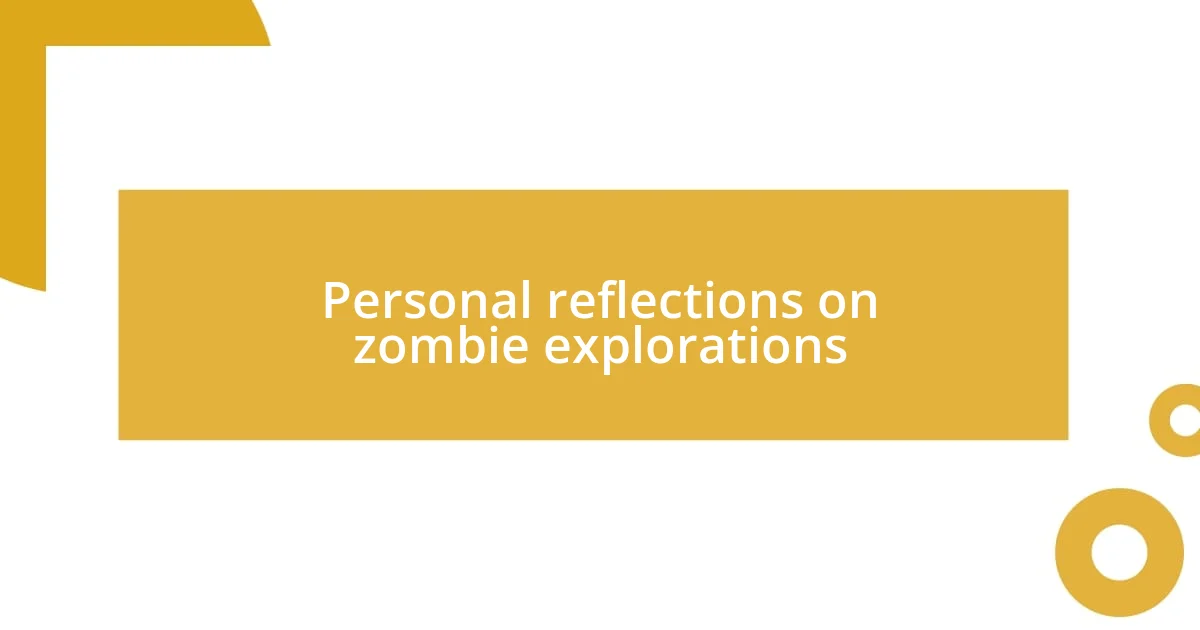
Personal reflections on zombie explorations
Reflecting on my encounters with zombie narratives, I can’t help but feel a sense of camaraderie with the characters. Each time I watch a film, I find myself pondering the moral dilemmas they face. For example, during a particularly gripping scene in “World War Z,” I remember exclaiming out loud, “What would I do in that situation?” That moment illuminated how deeply these stories resonate with my own struggles and fears.
One night, fueled by a bowl of popcorn and a chill in the air, I watched “The Night of the Living Dead.” I was struck by the isolation the characters felt, mirroring my own experiences in challenging times. It led me to reflect on our reliance on community and how, oddly enough, the threat of zombies pushes people together. I could almost feel a shiver down my spine as I questioned, “In a crisis, would I band together or retreat into solitude?”
The sheer variety in zombie tales has also sparked curiosity in me about human nature. I remember having a lively debate with friends about whether zombies are purely monstrous or if they mirror our own human flaws. It’s strange how these decaying figures on screen evoke such rich emotional discussions. Each exploration has left me not just entertained but introspective, prompting me to ask: Do these stories prepare us for crises, or do they simply highlight our vulnerabilities?

Lessons learned from zombie stories
As I reflect on the lessons gleaned from zombie stories, one that stands out is the importance of resilience in the face of chaos. I vividly recall a scene in “The Walking Dead” where characters face impossible odds, yet they band together to overcome their struggles. It resonated with me, making me think about how, in my own life, resilience and teamwork often shine the brightest during difficult times. How often do we forget that a united front can be our greatest weapon against adversity?
Another lesson I’ve absorbed is the duality of human nature revealed through the zombie genre. I remember watching “Shaun of the Dead” and laughing at how absurdity can coexist with moments of deep reflection. It left me pondering: do we often mask our fears and vulnerabilities with humor, even in the darkest times? I realized that this blend of laughter and horror reflects my own coping mechanisms when grappling with life’s challenges.
Lastly, navigating the precarious landscape of trust emerges as a recurring theme. In “Train to Busan,” the tension between self-interest and collective well-being hits home for me. I found myself asking, “What would I prioritize—self-preservation or the safety of others?” This stark exploration pushed me to evaluate my own relationships and the fragility of trust. It was a stark reminder that even amidst the threat of zombies, the real monsters often dwell within us.
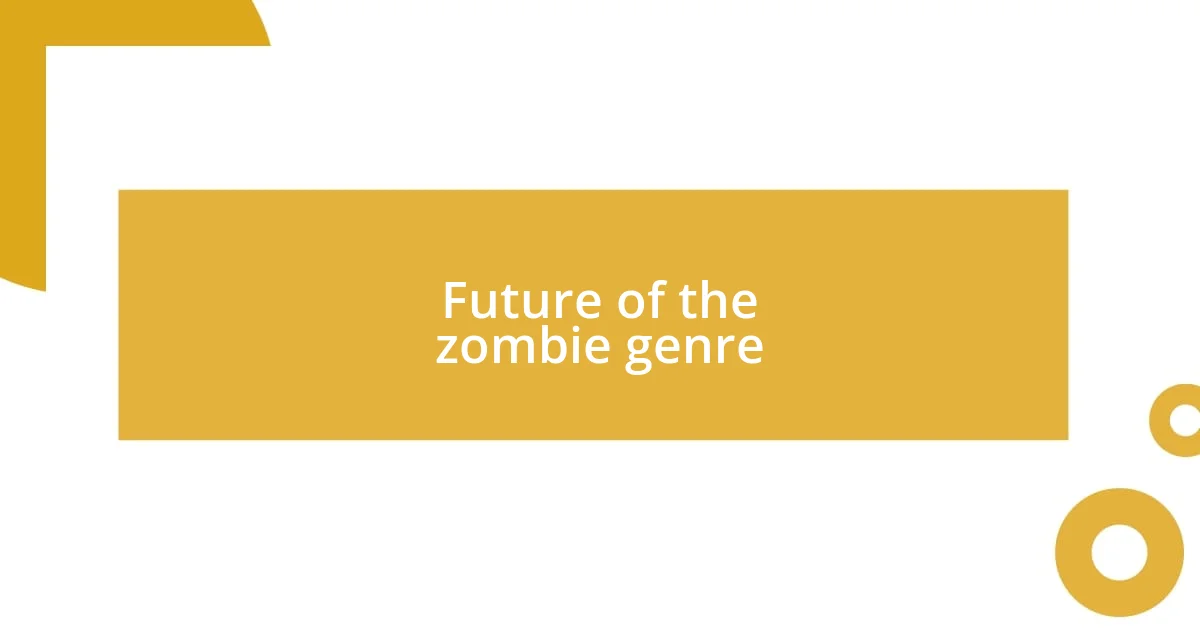
Future of the zombie genre
The future of the zombie genre holds intriguing possibilities, especially as creators experiment with storytelling formats. I’ve been captivated by the rise of interactive experiences, like video games that force you to make intense choices, amplifying the tension. Imagine navigating a world where every decision could mean life or death, pushing you to confront your values in a visceral way.
Another fascinating direction is the merging of genres. When I watched “Zombieland,” I saw how humor intertwined with horror can create refreshing narratives that engage a wider audience. I can’t help but think, could we see more mix-ups, like zombie romance or sci-fi mysteries? It’s an exciting thought—transforming the undead from sheer terror into rich, multifaceted characters that challenge traditional views.
Looking ahead, I sense that the zombie genre will increasingly delve into social commentary. Reflecting on films like “Get Out,” I appreciate how horror can be a powerful lens for examining societal issues. I can imagine future zombie narratives that tackle themes like climate change or pandemic responses, prompting us to ask hard questions about our humanity. How might we relate to these stories in the context of our lives? The mix of horror and reality could make for compelling and thought-provoking experiences that resonate deeply with audiences.
